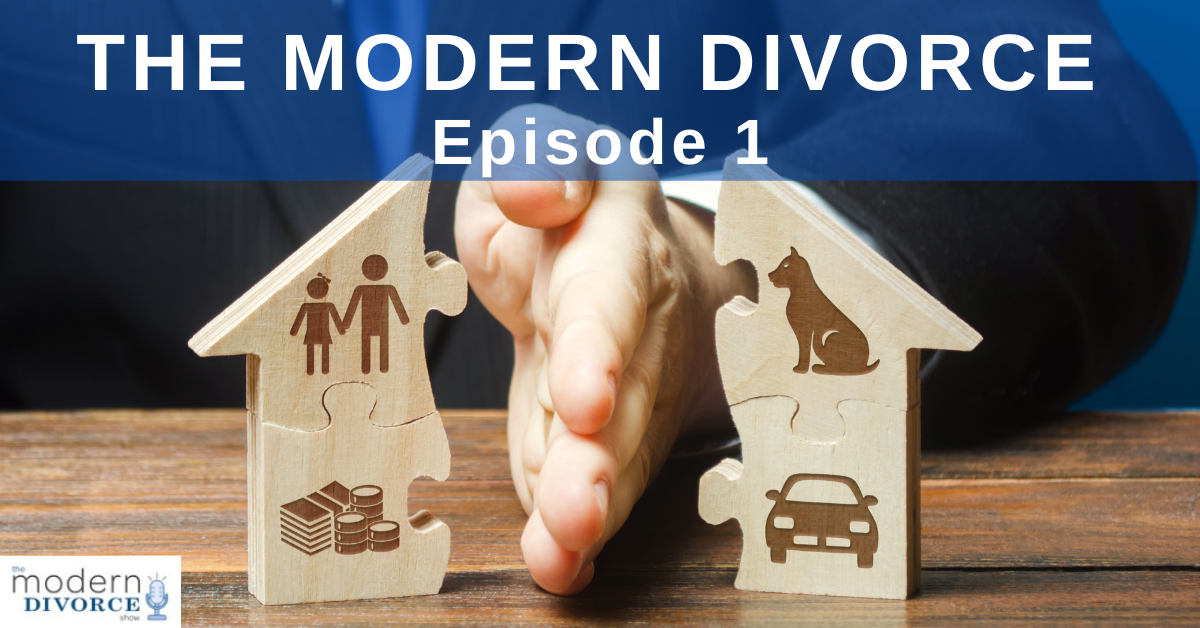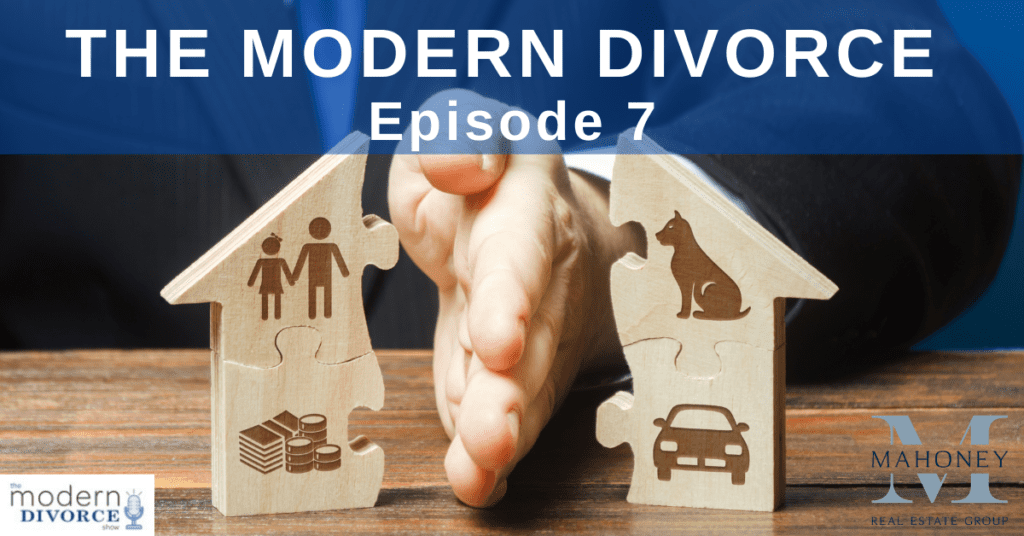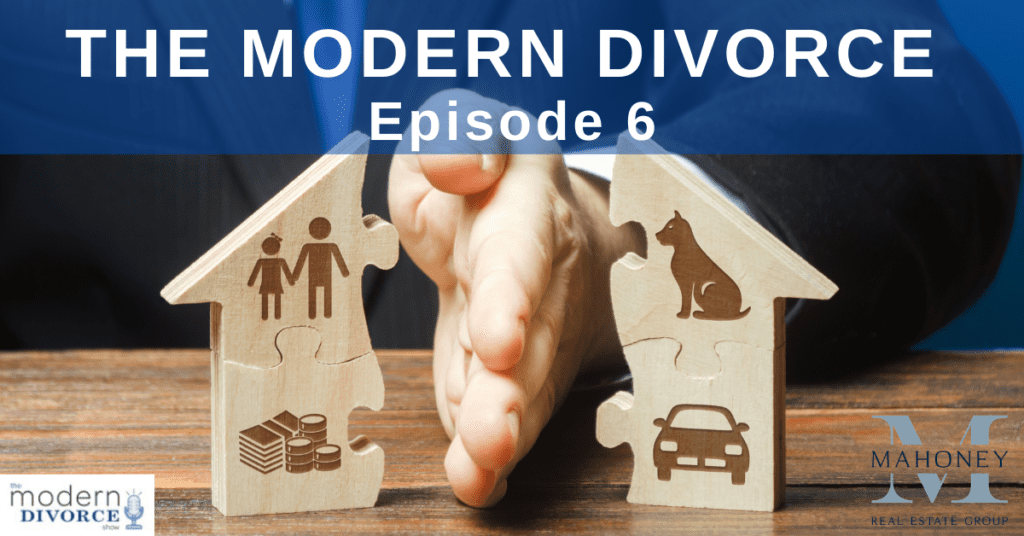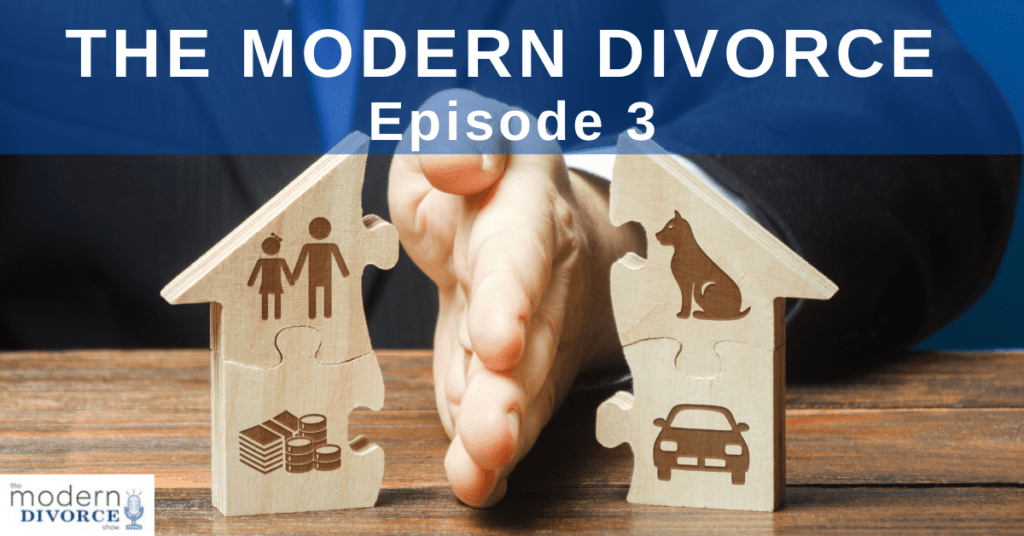Hello Friends! Sean here and I have some great news to share. Have you heard of The Modern Divorce Show? It’s a great new show that airs every Saturday at 10:00 am ET on 105.9 FM The Region and yours truly is part of the cast! Each week, the show covers topical issues relating to divorce in the 21st century and I provide a real estate perspective along with my incredible co-hosts, Anna-Marie Musson and John Panagakos. Take a listen below or read the transcripts; please leave a note in the comments letting me know what you thought!
ANNOUNCER (Intro): This is the modern divorce show with Anna-Marie Musson. Featuring Steve Cassar and family lawyer Anna-Marie Musson.
Steve: Hello everyone and welcome to the Modern Divorce Show with Anna-Marie Musson, where we are changing the conversation around divorce. Each week we will discuss the difficult issues surrounding separation and divorce because let’s face it, all of us know someone who’s gone through the difficult process. Real people, facing real challenges. And during this COVID times that stresses that much more.
We will be talking about the Modern Divorce Process, you know, from finance to real-estate, to mortgages, to pre-nups, mental health, dating and Yes, even what to do with that engagement ring.
Helping you navigate all that and much more is Veteran Family Lawyer Anna-Marie Musson of the Musson Law Firm. Anna-Marie is a seasoned court litigator, but her focus now is collaborative law which is designed to help clients save money, preserve relationships, especially, when children are involved. Anna-Marie let’s start there, let’s start by defining collaborative divorce. What is it?
Anna-Marie: Well, Collaborative Divorce is a process where the lawyers and the people agree to work together and not against each other, so that idea of casting the other person in the worst possible light is gone, instead the people agree that they don’t wanna leave these really important decisions to a stranger, a judge who doesn’t really know much about their family at all, and depending on the clients issues involved we’ll often times bring experts in. So, perhaps a financial neutral or a social worker if there are child issues at play, and we’re really working hard to solve these family’s issues.
Steve: We’ve all seen the TV shows, the legal dramas, you know, the stereo-typical 2 lawyers going head-to-head battling it out in this toxic legal battleground, where someone, a stranger as you say decides life-changing decisions, makes those decisions for people they don’t even know.
Anna-Marie: And these are decisions that will carry on for years to come. So, instead in the Collaborative Process, what we do is, the spouses agree from the get-go, they’re not gonna get destructive. So instead, they make the decisions that they’re gonna work through all of these issues in the divorce. And I found first hand seeing it with clients once that threat of court is gone and it’s not hanging in the background, people are able to be more open, they’re able to be more honest, they’re able to work towards really important resolutions and meeting those schools that the family is looking to achieve.
So, think about it. Imagine all that time and money and stress that you spend figuring out how to make that other person look absolutely horrible before a judge and what if you took that time, and energy, and money and put it towards actually working on what really matters, and that’s making important decisions for your family.
Steve: Huge decisions. Now, we mentioned it a couple of moments ago, You’ve walked the walk in the world of litigation. Why did you become trained in the field of collaborative law?
Anna-Marie: I was a Litigator Downtown Bay Street for over 15 years. I saw first-hand how family relationships were being destroyed by the court and trial process and truthfully, many struggled to get back any of that goodwill. In many cases, it was years before these relationships even started to repair and some, they were irreparably damaged, they were never going to be fixed.
So, for me. No matter how many court cases I would win, and they were big wins as a trial lawyer, there was always a loss, there was a loss of relationship, there’s a loss of money, there’s a loss of time. And the kids, they were always caught in the middle of this and they were the ones really who had to hold this burden. So, I knew there was a better way to help families and that’s why I studied the collaborative law and that’s why I moved my practice to this area.
Steve: One of the big areas of uncertainty during modern divorce is real-estate. Our weekly expert is Sean Mahoney of Harvey Kalles and Principal at the Mahoney Real Estate group.
Anna-Marie: Hi Sean! Thanks for being with us today.
Sean: You’re welcome! Pleasure to be here.
Anna-Marie: So, Sean, there are a million of agents out there, how do you pick the right one?
Sean: There definitely are a lot of agents in the city of Toronto and just in Ontario, in Toronto alone there’s fifty-five thousand, to give you some context that’s about twice as many agents as there are in New York city, furthermore, about 75% of them only do 4 deals or less, so most of them are part time. When you’re choosing the agents, you want to make sure that you know they’re experienced, an experience just doesn’t come in years but how many deals that they’re doing, do you trust them, like when you’re with them do they sound confident? Are they asking you lots of questions? You know finding the right agents, it takes time and effort and so you want to make sure that you’re asking them lots of questions but they’re asking you lots of questions, how did they communicate? Really at the end of the day, just get a feel for their professionalism and you know who they are as person.
Anna-Marie: I love how you said that trust factor because I think it is so important dealing with real-estate. What are some questions you should be asking when interviewing your agent?
Sean: I would say again experience. How long have you been in the business? How many transactions do you do? With 75% only doing 4 deals or less, that’s 1 deal every 3 months. You want somebody who’s active. You know the market is changing literally week-to-week. You know somebody who’s in the trenches, what’s their marketing? I mean if you’re selling a property. What’s the exposure of the property? Do they list more properties than they purchase? Their buyer pool, their reputation with other agents because let’s face it there’s definitely a collaborative real-estate transaction, you wann have good relationship that helps. There’s a long list of questions but again those are the some that I would concentrate on.
Anna-Marie: Now is there a magic number of how many agents should you interview before you make this really important decision?
Sean: I would say 2-3 staggering statistics that I read was 80% of people interview only 1 agent and I think people do themselves to this service because there really are different calibers and when you’re going through seemingly the 2 of the most stressful situations in 1 life, you know divorce and selling, you wanna make sure that the decision you make is the right one. Not so often, I’m sitting at the table being interviewed and just recognized that people can’t be vulnerable or don’t wanna ask a question and my job is to make then feel comfortable to be able to ask any question and that should be the first and foremost so, get an idea, ask lots of questions, make sure they’re asking you lots of questions if they’re not understanding you’re situation then they can’t really give you the highest level of service, and so you know you would get a good feel for that, unless you just get the one-hit wonder and you find somebody that you just absolutely trust whole-heartedly then that’s okay too but definitely give yourself some choice.
Anna-Marie: Can you give me 1 red flag that people can watch out for.
Sean: I would say, talking too much. This is an industry where everybody’s situation is different and if they’re not getting to understand your unique situation, your needs to fully understand how they can best service you. That would be a big red flag for me and as well as I think experience is a big big one.
Anna-Marie: Thank you Sean! See you back here next week. Sean Mahoney is the principal at the Mahoney Real Estate Group. He can be reached at enjoyyourwealth.ca.
Steve: And coming up on the Modern Divorce Show, We’re going to dive into the world of separation mortgages. What are they? What happens when 1 mortgage becomes 2 or more? We’re back in a moment.
|| Commercial ||
Steve: Welcome back to the Modern Divorce Show with Anna-Marie Musson. Anna-Marie, I’m trying to envision what it possibly was like, walking into that courtroom, strapping on your armor, mentally preparing, emotionally preparing, it sounds hellish to me.
Anna-Marie: You’re not alone. A lot of clients of mine would’ve said the exact same thing and had the exact same feelings. But for us lawyers, this is what we trained for, this is what we got to do, this is really the experience we’ve worked towards all those years through law school and all those years practicing law and so for us we’re trained to win. And the way lawyers do that is being the most zealous advocate we can and the only way we could do that walking into the courtroom, and winning cases and being this zealous advocate was by showing the other side in the absolute worst possible light and so we would find as much information as we could with the focus of winning the case because that’s what lawyers do. And when you talk about it being a battle, it is a battle. It is exhausting. It’s exhausting for the lawyers, it’s exhausting for the clients, it’s exhausting for the judge. And so at the end of the trial, when we would have big wins and we would be celebrating these wins because this is what we’re trained to do.
The clients at the end would be left having to pick up the pieces, of what happened on that witness stand. And when the lawyers can close their files and we move on to our next case, and the judges close their docket list and move on to their next case, the families are left dealing with the damage.
Steve: You checked off a lot of boxes there, so given all that experience, all that emotional preparation. How does that help you advise your clients?
Anna-Marie: Well, the first thing I do with any client who tells me that they want to go to court is I actually make them envision the experience and what I mean by that is walking into the courthouse, getting past security, going into the courtroom, standing in the witness box, all of these things, imagine the stress. And then we also work with them and get them to understand what it’s like to be cross examined? What’s it like to have someone question every decision you’ve made, about your kids, something that matter so much to you and I will tell you 99 percent of the time they don’t want that, they will absolutely say that it is not a process or a system I want to be a part of and that’s just when they make the decision to work in a collaborative divorce.
Yes, there are bitter feelings. Yes, there is pain. But this more modern approach to divorce it saves the money, it saves some stress and it saves them that pain.
Steve: Okay, so all that considered, how did the decision to turned to a collaborative law? How did that decision come about? Was there or where’s that A’HA! moment?
Anna-Marie: Oh, for me it’s so crystal clear. I can picture it even today just having this conversation with you. There was a text message that was sent from one of my clients’ son, he was a teenager, to his mother, and this text message was very emotionally heated and said some extremely hurtful things and I had no choice but to put that text message in my court materials before the judge, and the reason that decision was so difficult was number 1, it is now part of a public court record, so neighbors, friends, family members, the children themselves down the road with this simple google search potentially could access this information. But worse, we were reopening that wound for the family, the wound for the son, the wound for the mother, so for me after that experience I decided that I would not be continuing in a process that did that to families and instead that there had to be a better way and that’s when I turned to collaborative law.
Steve: Wow. Thank you. Thank you for sharing that. We know, one of the biggest concerns for couples can be where am I going to live? And how are we going to get 2 mortgages? It’s a dilemma that often forces people to stay in difficult or even abusive relationships longer than necessary.
Anna-Marie: And that’s why we’re tapping into the expertise of veteran mortgage agent John Panagakos. John is the creator and founder of Separation Mortgages. John, welcome!
John: Hey! Thanks for having me.
Anna-Marie: So, tell us. What are separation mortgages?
John: So separation mortgages, it’s a unique service that caters to specific people that are in midst of separation, separated in the mortgage financing or people that are you know, moving into a property together and may or may not have a co-habitation agreement and would like the mortgage separated for both parties.
Anna-Marie: And tell us why did you decide to create the service?
John: Uhm.. Many many years ago, what happened was there was a gap in the marketplace. So, lawyers and mediators would sort of pass of a file and say “Hey go get this for Mrs.Smith, Mortgage Financing” and with the ongoing rule changes that the government opposed, more clients are getting denied or declined. As a result, we went back to the lawyers and mediators and say “Hey, why not we consult on the mortgage piece of this so we can have a pre-approval or an approval as you’re speaking with the client? So, the process is more seamless?” And that’s why this was essentially created so there was less bumps toward the end of the separation or the separation agreement and we we’re more professionals work together to provide approvals.
Anna-Marie: I love that idea that you’re getting pre-approvals early on, I think that’s a real game changer.
John: Oh! It definitely is, and it certainly provides more comfort and it also provides clients with the ability to move forward because often mortgages can be very complex and not everyone understands them and so when you’re able to say to the client “Hey, you’re approved that this is what your budget’s gonna look like, this is what your month of payment is gonna look like” then quite frankly they’ll probably going to move forward signing a separation agreement versus having a bunch of unknowns. So in this case, it’s the horse before the cart scenario. So we’re able to say “Hey, Mrs. Smith, you’re gonna be paying $24 a month for your mortgage, you will be separated, this is the way the process works and let’s make sure that you have a positive cash loan each and every month”.
Anna-Marie: Now, a lot of people are surprised to know that getting a mortgage is quite different when you’re getting a divorce. Can you explain a little bit about this?
John: Yeah. So there are several differences between we’ll call it, one called single or married couples, and people who are in the process of separation. People who are in process of separation often rely on spouse’s support income and/or child support income. There’s not too many banks that will allow, say “Mrs. Smith, used 100% of the spouse’s support and child support payment in order to qualify for mortgage.” Some banks will only allow 30-50% of that monthly income to qualify for mortgage. So it can become very very frustrating for the clients so this is why people prefer us and we’re able to say “Based on your unique circumstance you need to approach this bank, we will help you approach this bank because you need 100% of the child support, spouse support in order to qualify for mortgage” or “Guess what Mrs. Smith, you’ll only need 30% of the spouse support income, we can approach banks A, B, C and D”. And then we’re able to provide the terms and pros and cons of each and the client is able to make the best decision for him or herself.
Anna-Marie: Thank you John. This has been extremely helpful! John Panagakos can be reached at his website Separationmortgages.com. See you next week.
Steve: And coming up. A conversation about surprising new trend in divorce. As the modern divorce show with Anna-Marie Musson continues.
|| Commercial ||
Steve: And welcome back to The Modern Divorce Show with Anna-Marie Musson. Anna-Marie, tell us what are some of the new trends you’re seeing in family law?
Anna-Marie: Well, one of the biggest trends we’re seeing right now, is negotiating separation agreements while couples are not physically separating. So, the couples are continuing to live together. They have absolutely no plans to move out of the home. Instead, they’re gonna have separate space in the home. They have formal parenting schedule, formal parenting time with the kids but is actually set to a schedule, and they have separate finances, they separate how the house is to be maintained. So, really is this idea of complete separation of the marriage but physically remaining in the same home. And the trickiest part in negotiating these agreements is dealing with these new relationships because inevitably the couple will meet someone new and how do we deal with this issue of house guests within this type of situation? So, we have to have some very uncomfortable discussions and we have to figure out ways and solutions that makes sense for the family living in this type of arrangement.
Steve: I’m just gonna imagine breakfast. Uhm. So, Walk me through this. Cause I’m just listening here and shaking my head. Why would someone do that to themselves? Why put themselves through that? It’s clearly finances must be one of the drivers.
Anna-Marie: Not all the time Steve. What’s most interesting is, the families and couples who agreed to this arrangement for the most part is for the kids. They don’t want the kids having to go back and forth between different houses, finances definitely play a role in it because in the GTA as you know house prices can be quite significant, this can be the families main asset. And so, they don’t want to have to sell the home and move in to two smaller homes or rent, and so, for them this solution makes the more sense.
Steve: Wow! So, It was never ever easy and that’s why where here, to change the conversation around divorce. I’m Steve Cassar.
Anna-Marie: And I’m Anna-Marie Musson. Thanks for listening!
I hope we’ve helped you in some way today. If you have any questions, please send them along . You can reach us at our website TheModernDivorceShow.com
|| ANNOUNCER ENDING ||
Separating? Divorcing?
Before making a move, make sure you have knowledge on your side. Get the advice you need from an experienced real estate agent to ensure a fair and equitable distribution of real estate assets. Reach out to The Mahoney Real Estate Group today to stop stressing about your divorce and start enjoying your wealth!




